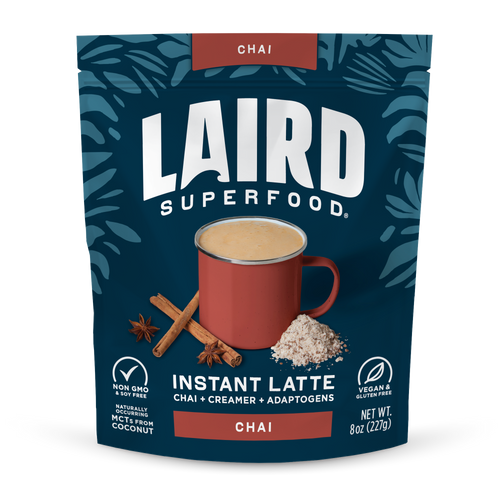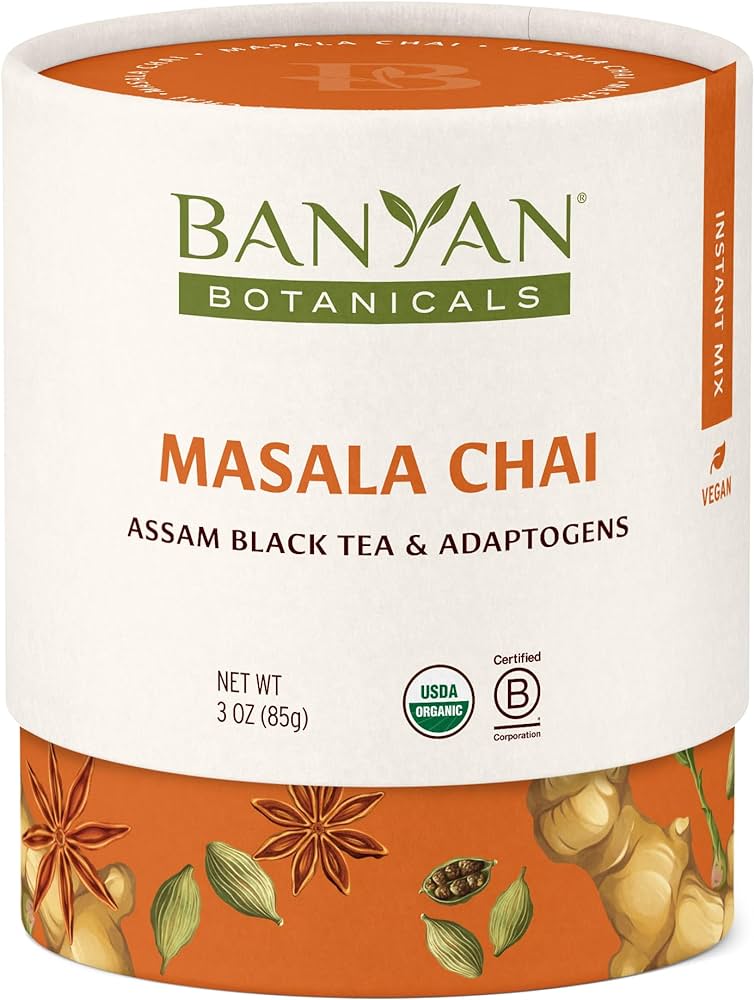A typical Chai Tea Latte contains about 40-70mg of caffeine per 8 oz serving. The caffeine level can vary based on the tea blend and preparation.
Embarking on a quest for the perfect balance of spice and energy, the Chai Tea Latte stands tall as a favorite beverage among tea enthusiasts. Its distinctive blend of black tea, cardamom, cinnamon, ginger, and milk delivers not just invigorating flavors but also a moderate caffeine kick.
Ideal for those seeking a warm, comforting drink with a gentle energy boost, a Chai Tea Latte offers a middle ground for those who are sensitive to the higher caffeine content found in coffee. Whether you’re cozying up with a book or needing a pick-me-up during a busy day, understanding its caffeine content helps you enjoy this aromatic indulgence to its fullest. This milky, spiced classic finds its roots in Indian tradition and has burgeoned in popularity across coffee shops around the world, often enjoyed as a soothing alternative to coffee.
The Allure Of Chai Tea Latte
The Allure of Chai Tea Latte captivates with its exotic blend of spices and soothing warmth. This delightful beverage combines rich black tea, aromatic spices, and creamy milk. It does so in a perfect symphony of flavors. Chai Tea Latte offers a unique experience. It is a treat for the senses and a comforting embrace in a cup. Its caffeine content provides a gentle boost, contrasting with the tranquility of its traditional ingredients.
Nostalgic Origins And Modern Comeback
Chai Tea Latte whispers tales of ancient Indian kitchens. Here, it was crafted with a blend of black tea and spices such as cardamom, cinnamon, and ginger. These kitchens were the birthplace of Chai. Its journey to cafés around the world marks a modern comeback. Today, Chai Tea Latte stands at the intersection of tradition and trendy consumption. Its rich history adds depth to each sip. This rich history entices enthusiasts across ages and cultures.
Cultural Fusion In A Cup
The drink is a mosaic of global influences. It exemplifies cultural fusion. A sip of Chai Tea Latte offers more than just flavor; it is a testament to the harmonious blending of different worlds. This is evident in the spicy-sweet taste. The taste resonates with the diversity of tastes from across the globe. The common spices found in Chai include:
- Cardamom: Energetic and sweet
- Cinnamon: Warm and comforting
- Ginger: Zesty and pungent
- Cloves: Bold and intense
- Pepper: Sharp and spirited
Each ingredient contributes to the alluring caffeine-kissed drink. This drink is as much about art as it is about taste. The creamy foam atop speaks of modern café culture. This culture blends seamlessly with the timeless tradition embodied in every steaming cup of Chai Tea Latte.

Caffeine Content Breakdown
A favorite for many, the Chai Tea Latte blends spices, sweetness, and a gentle caffeine kick. Whether enjoying a morning boost or a cozy afternoon break, it’s important to understand how much caffeine a Chai Latte contains. This section explores the caffeine content in a Chai Latte and how it compares to other popular beverages.
Let’s unveil the mystery behind the caffeine levels of a Chai Latte versus a cup of coffee. For many, caffeine is a crucial factor in their beverage choice. Discover how these two favorites stack up against each other.
| Beverage | Caffeine Content (average) |
|---|---|
| Chai Tea Latte | 50-70mg |
| Regular Coffee | 95-200mg |
A standard Chai Latte generally has less caffeine than a cup of coffee. This makes it a suitable choice for those seeking lower caffeine intake.
Different elements affect the caffeine level in a Chai Latte. Let’s examine each factor:
- Tea Quality: Higher quality tea may have more caffeine.
- Steep Time: The longer the tea steeps, the more caffeine it releases.
- Milk Ratio: More milk dilutes the caffeine concentration.
- Spice Mix: The type and amount of spices can impact caffeine content.
Every Chai Latte can differ based on these factors. Customizing your Chai Latte allows you to manage its caffeine content. Choose wisely based on your preferences and caffeine sensitivity.
Health Benefits Of Chai Latte
Chai Latte offers a unique blend of spices, milk, and tea. It brings cozy warmth and soothing comfort with every sip. This aromatic beverage goes beyond just a caffeine kick. It brings an array of health benefits to the table.
Spice Symphony: More Than Just Caffeine
Each spice in a Chai Latte plays a note in a harmonious symphony for your health. Cinnamon can boost your metabolism. Ginger aids digestion. Cardamom may reduce blood pressure. Cloves pack antioxidants. And black pepper can improve nutrient absorption.
- Cinnamon: warms the body, balances blood sugar
- Ginger: eases digestion, fights inflammation
- Cardamom: supports heart health, freshens breath
- Cloves: rich in antioxidants, protects cells
- Black Pepper: boosts nutrient uptake, enhances flavor
Balancing Energy: Pros And Cons For Your Health
Chai Latte does have caffeine, but less than coffee. It gives a gentler rise in energy. The tea component may help with focus and calmness. Yet, it’s important to consider milk and sugar content which can add calories.
| Pros | Cons |
|---|---|
| Smoother energy boost than coffee | High sugar content in some recipes |
| Improves alertness and focus | Possible lactose intolerance from milk |
| Spices may offer health perks | Excess caffeine for some individuals |
Preparing The Perfect Chai Latte
Everyone loves a good chai latte, with its warm spices and comforting aroma. But preparing the perfect Chai Latte is an art form. It involves a delicate balance of flavor and, of course, managing the caffeine content to suit your preference. Let’s dive into the intricacies of crafting the ultimate chai experience.
Traditional Vs. Modern Brewing Methods
Brewing the perfect chai can be an exquisite journey through tradition or a quick trip with modern convenience. Traditional brewing involves
- Simmering whole spices,
- Black tea leaves, and
- Milk.
This method unlocks deep flavors and allows you to revel in the original chai ritual.
Modern methods, however, offer speed and simplicity with
- Pre-mixed powders,
- Concentrates, or
- Pods.
Choose based on the time you have and the depth of flavor you desire.
Adjusting Caffeine Levels To Taste
Chai’s caffeine content varies. It depends on the tea leaves you choose and the brewing time. To adjust, consider these points:
| Type of Tea Leaves | Brewing Time | Caffeine Content |
|---|---|---|
| Assam | 5 mins | High |
| Nilgiri | 4 mins | Medium |
| Decaf Black Tea | 5 mins | Low |
Less brewing time means less caffeine. Use decaf tea for the lowest caffeine content. Personalize your chai with your ideal balance.
Chai Latte: Your Questions Answered
Chai Latte: a beloved beverage that warms the soul and tantalizes the taste buds. But what’s really in that fragrant cup of spiced tea? Gather around as we dive into the world of chai lattes and answer all your pressing questions, especially those concerning caffeine content.
Decoding The Chai Latte Label
Ever wondered what’s behind the aromatic magic of your chai latte?
- Black Tea: The core ingredient, full of flavor and caffeine.
- Spices: Cardamom, cinnamon, ginger, and cloves create that signature taste.
- Milk: Creaminess comes from milk, dairy or plant-based.
- Sweetener: Often sweetened with sugar or syrup.
Caffeine levels in chai lattes can vary, but on average, expect around 50 to 70mg per cup. This is less than coffee which usually offers 95mg or more.
| Beverage Type | Caffeine (mg) |
|---|---|
| Chai Latte | 50-70 |
| Coffee | >95 |
| Green Tea | 25-29 |
Tips For Mindful Caffeine Consumption
Love your latte but mindful about caffeine? Here are some tips:
- Check Labels: Start by reading the details on your drink.
- Half-Caf: Ask for half the amount of chai concentrate.
- Smaller Size: Opt for a smaller cup to cut down caffeine.
- Herbal Chais: Go for caffeine-free herbal chai blends.
- Timing: Enjoy chai earlier in the day to avoid sleep issues.

Frequently Asked Questions For Chai Tea Latte Caffeine Content
How Much Caffeine In A Chai Latte?
Chai tea lattes typically contain less caffeine than coffee, with an average of 40-70mg per cup. The exact amount varies based on the tea blend and preparation.
Can Chai Tea Latte Be Caffeine-free?
Yes, chai tea lattes can be made caffeine-free by using decaffeinated black tea or a caffeine-free herbal substitute like rooibos.
Does A Chai Latte Have More Caffeine Than Coffee?
No, chai lattes generally have less caffeine than coffee. A standard cup of coffee has about 95-200mg of caffeine, while a chai latte has around 40-70mg.
What Affects Caffeine Levels In Chai Lattes?
Caffeine levels in chai lattes are affected by the type of tea used, the amount of tea leaves, and steeping time. More tea and longer steeping increase caffeine content.
Conclusion
Understanding your chai tea latte’s caffeine content helps manage your daily intake. This delightful beverage marries flavor and warmth with a gentle energy boost. Remember, caffeine levels vary widely, so choose your chai wisely. Embrace the balance of taste and vigor, and enjoy your latte responsibly!

